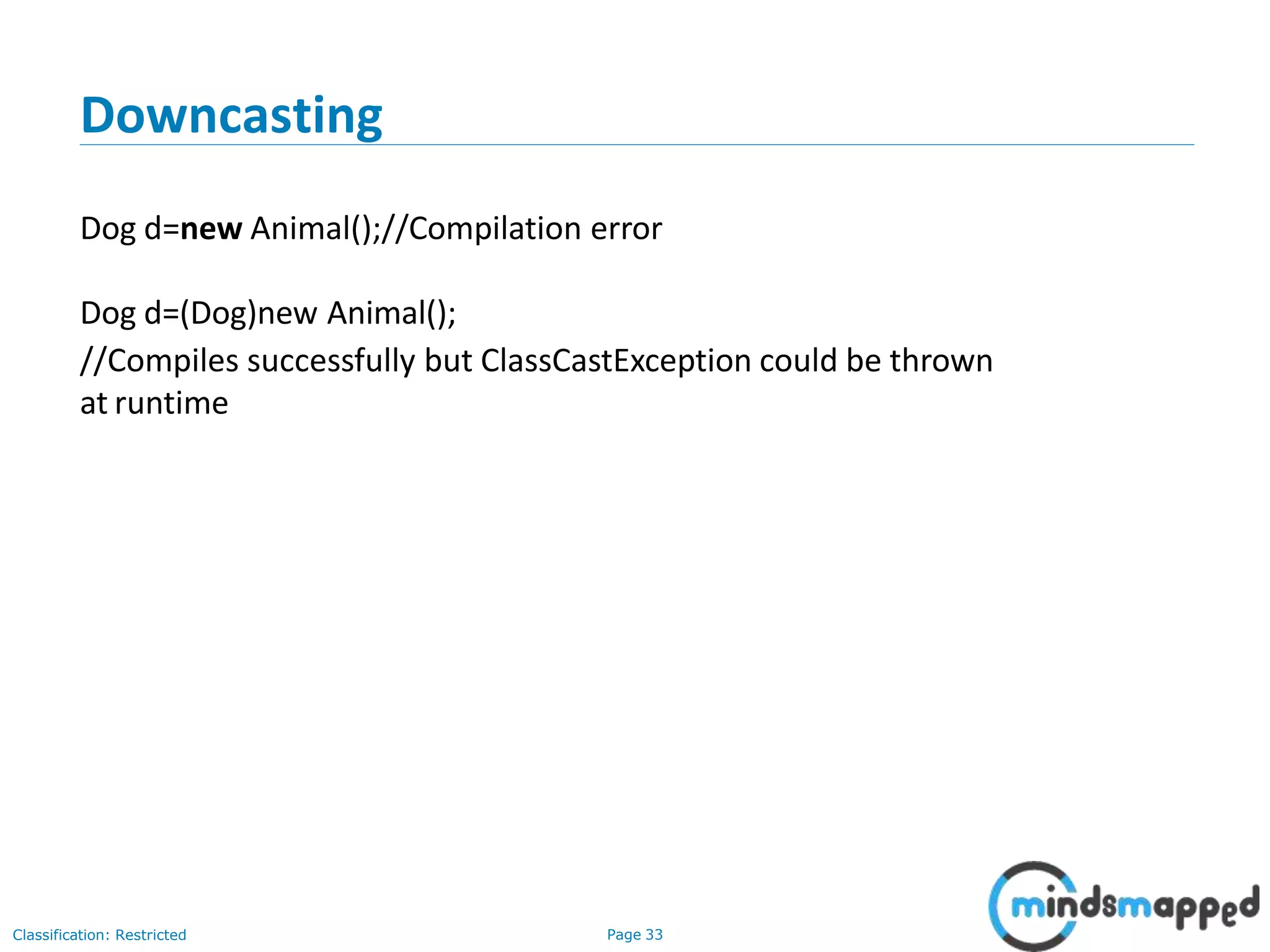The document provides an overview of Java object-oriented programming concepts, including inheritance, aggregation, polymorphism, method overloading, and method overriding. It explains the relationships between classes and addresses Java's restriction on multiple inheritance. Additionally, the document covers the use of the 'super' keyword, the 'final' keyword, and concepts related to static and dynamic binding, as well as the 'instanceof' operator.
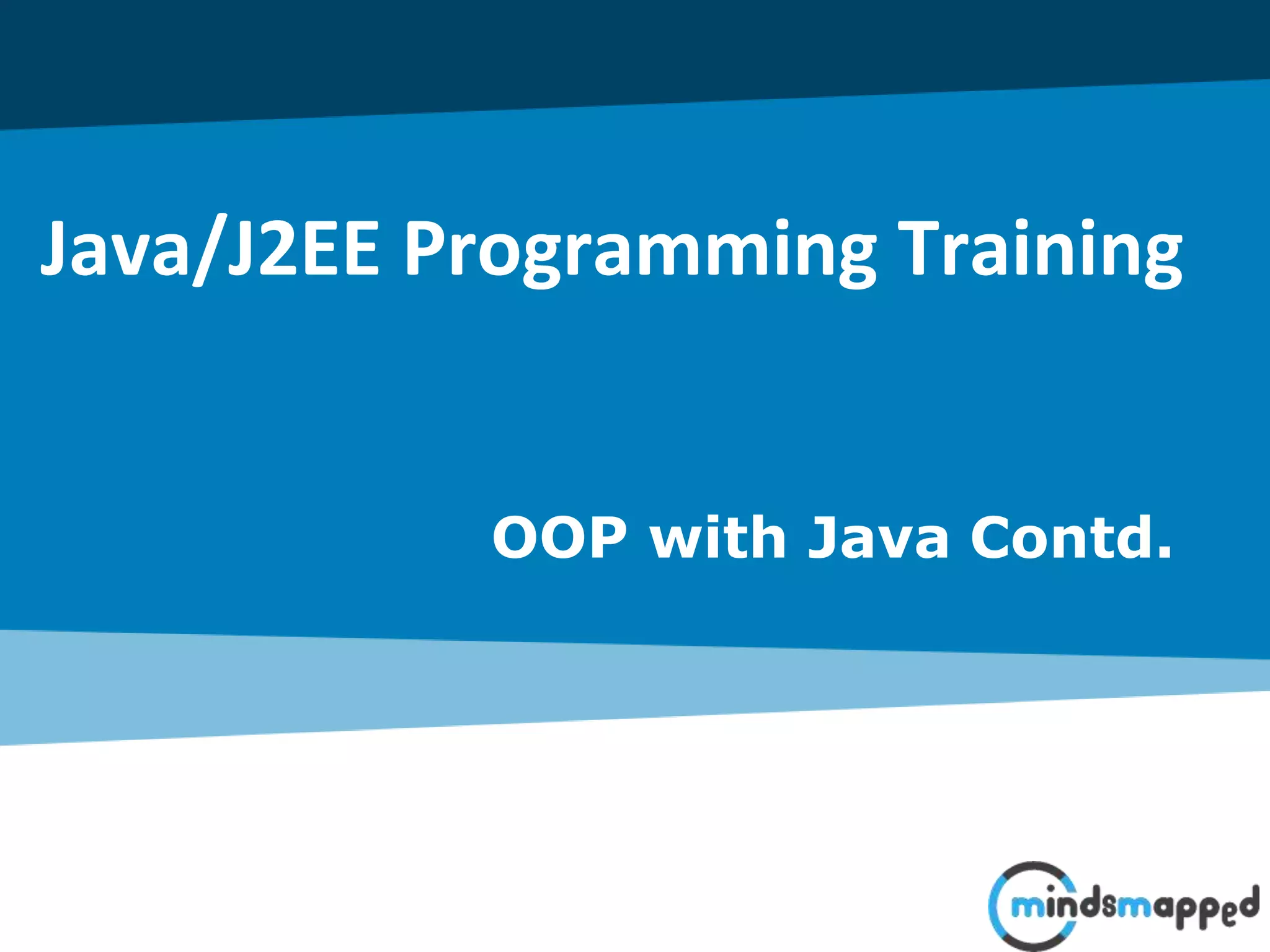
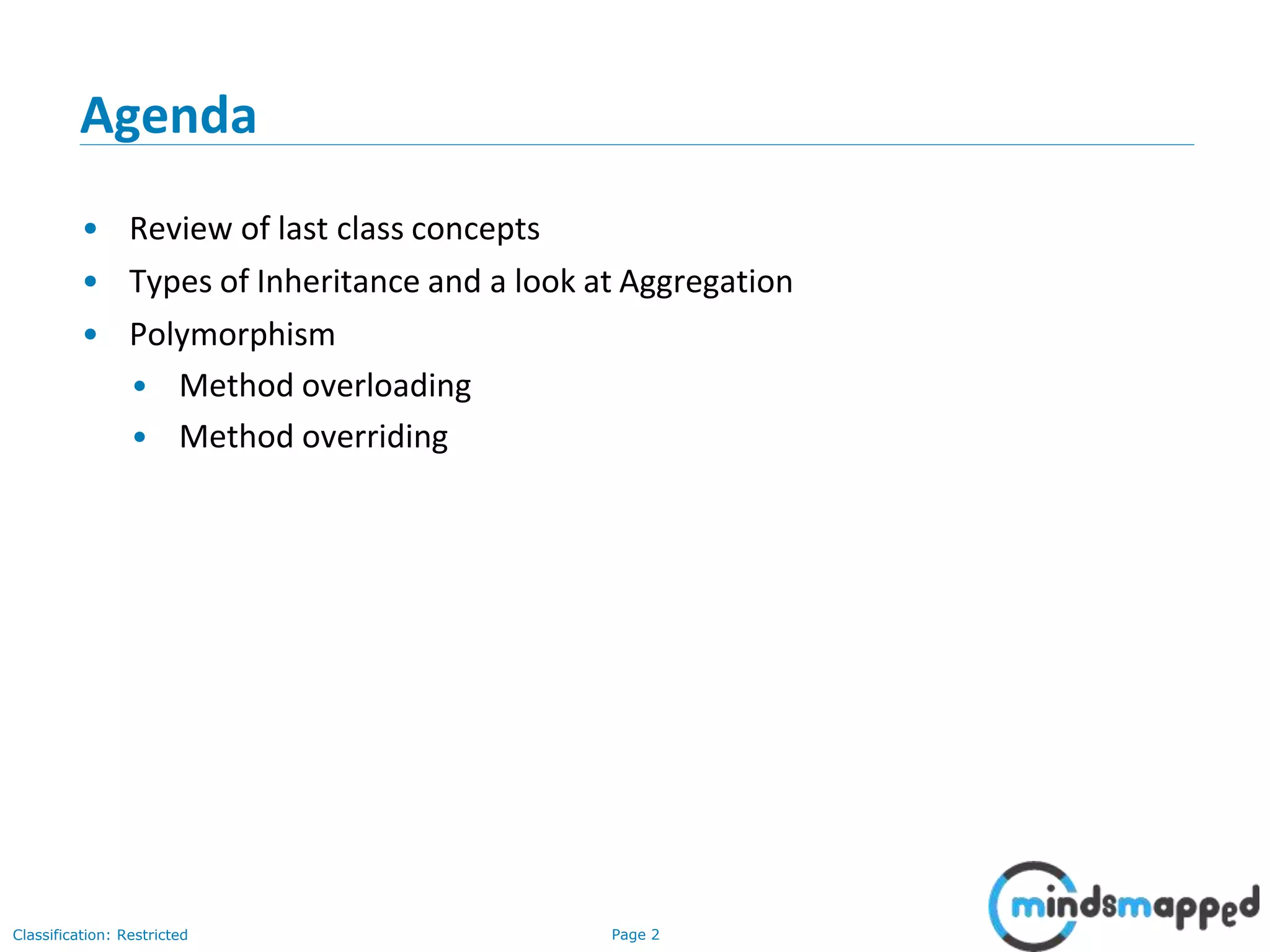
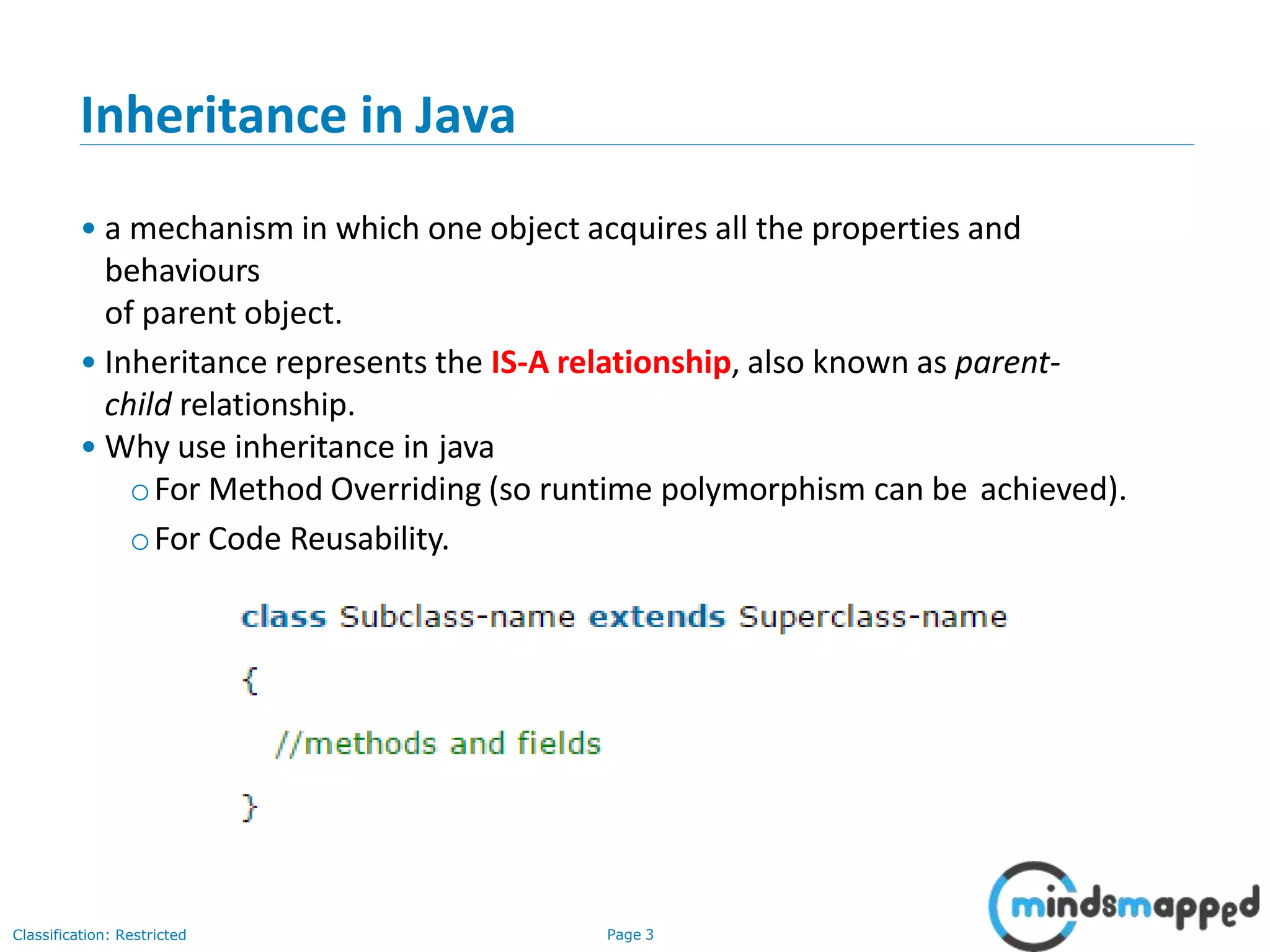
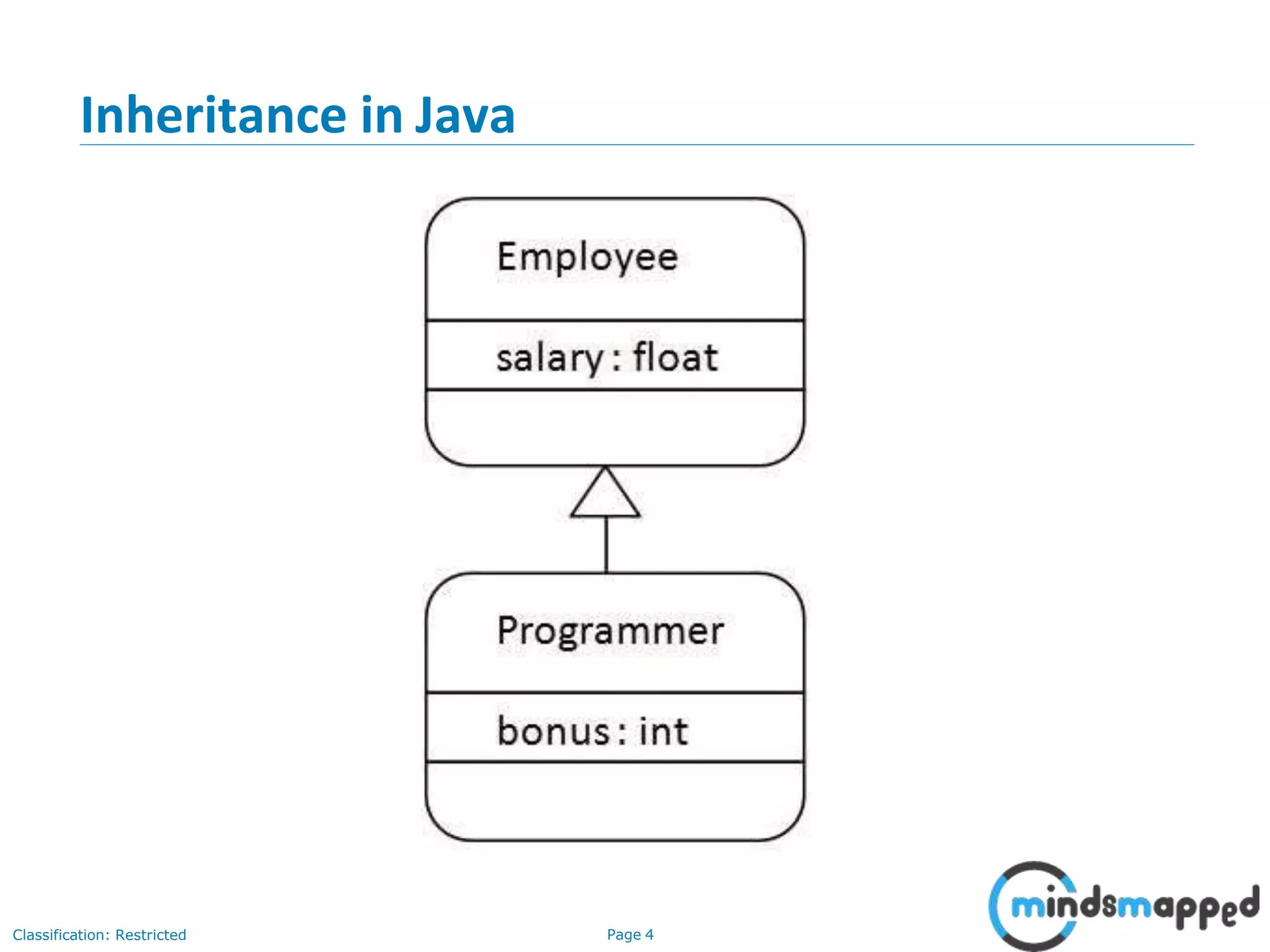
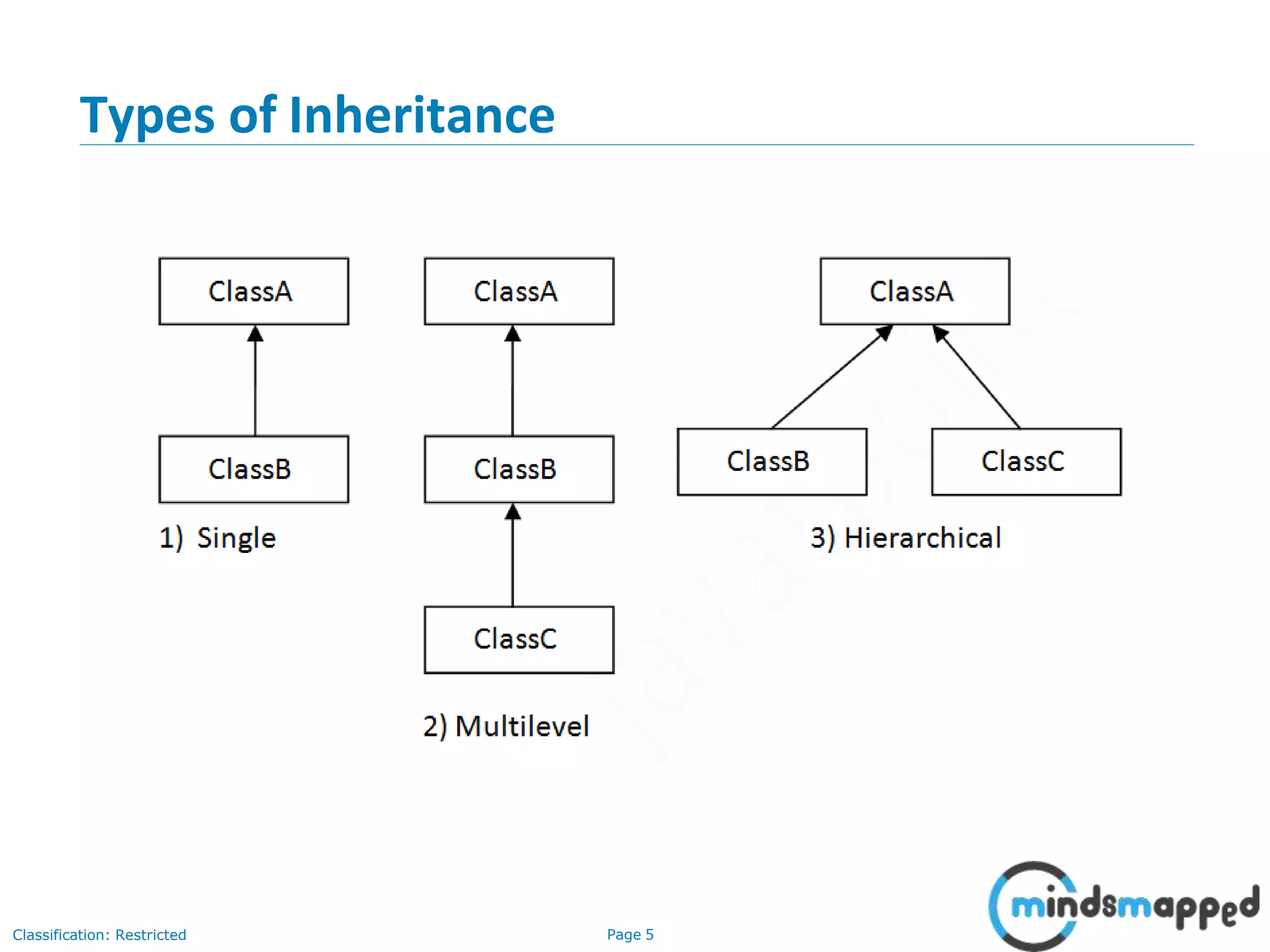
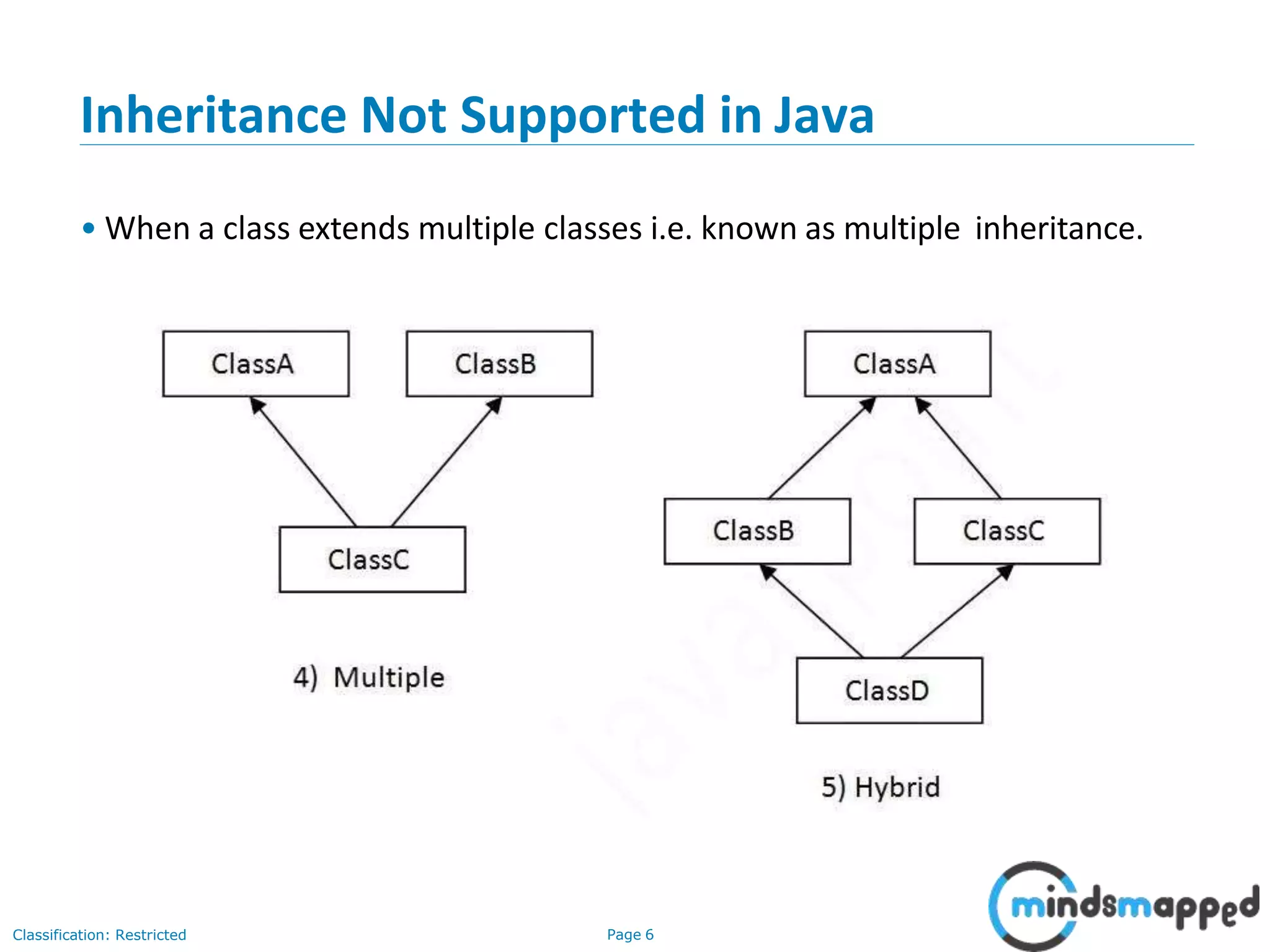
![Why multiple inheritance not supported in Java? Classification: Restricted Page 7 class A{ void msg(){System.out.println("Hello");} } class B{ void msg(){System.out.println("Welcome");} } class C extends A,B{//suppose if it were public static void main(String args[]){ C obj=new C(); obj.msg();//Now which msg() method would be invoked? Compile-time error } }](https://image.slidesharecdn.com/day9-oopwithjava-part3-180731213533/75/OOP-with-Java-Part-3-7-2048.jpg)
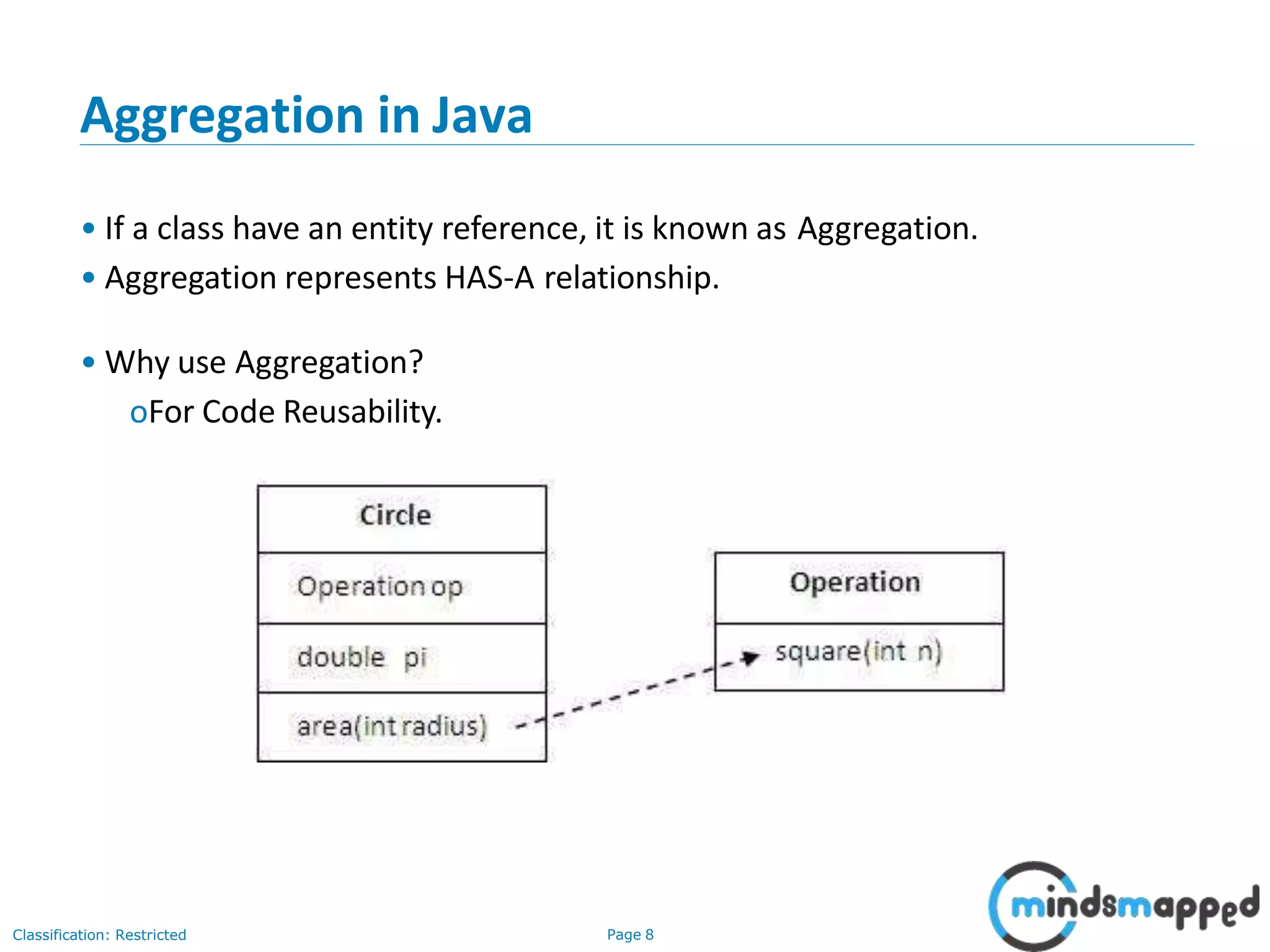
![Aggregation in Java Classification: Restricted Page 9 class Operation{ int square(int n){ return n*n; } } class Circle{ Operation op;//aggregation double pi=3.14; double area(int radius){ op=new Operation(); int rsquare=op.square(radius);//code reusability (i.e. delegates the method call). return pi*rsquare; } public static void main(String args[]){ Circle c=new Circle(); double result=c.area(5); System.out.println(result); } }](https://image.slidesharecdn.com/day9-oopwithjava-part3-180731213533/75/OOP-with-Java-Part-3-9-2048.jpg)
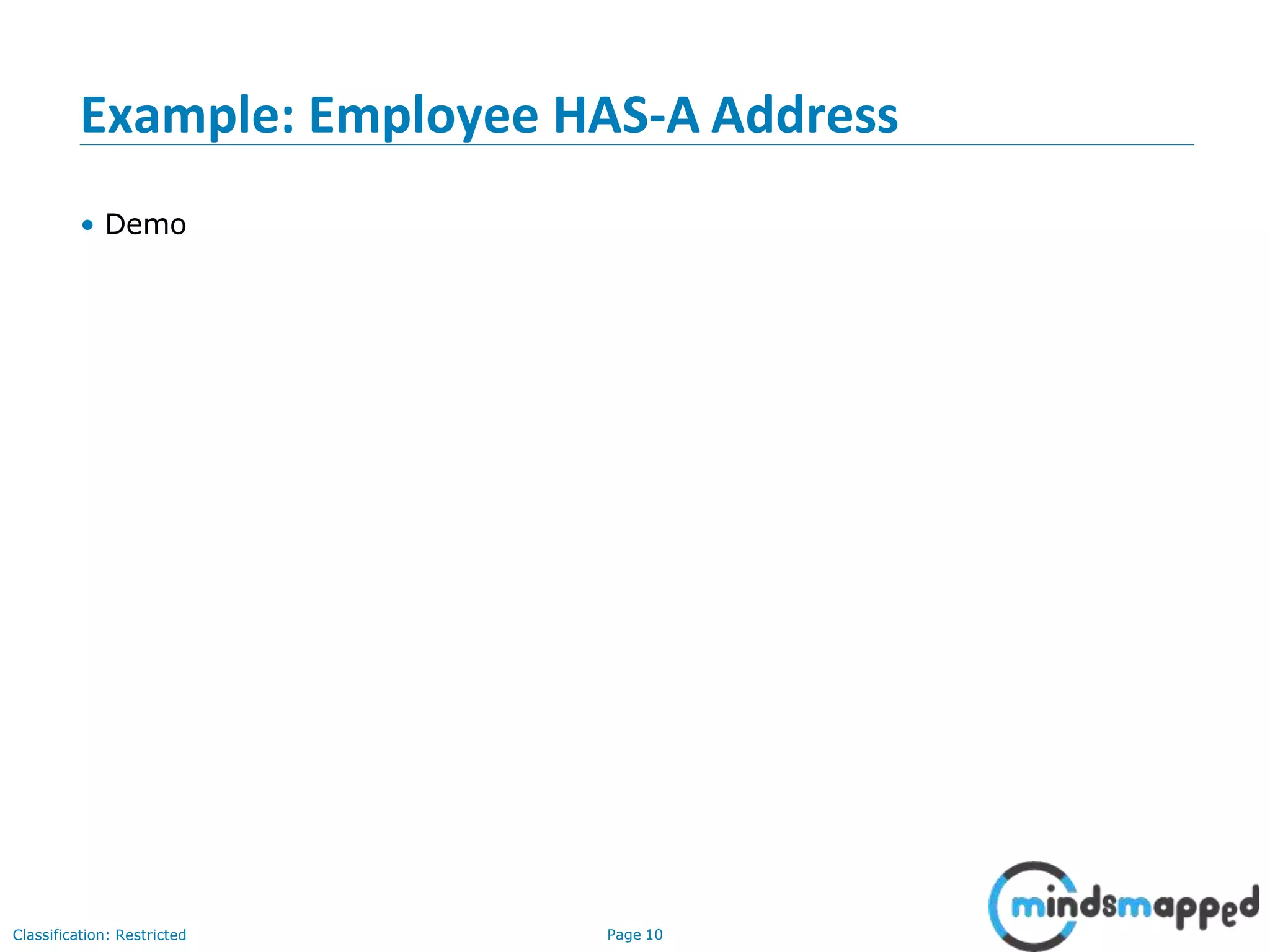
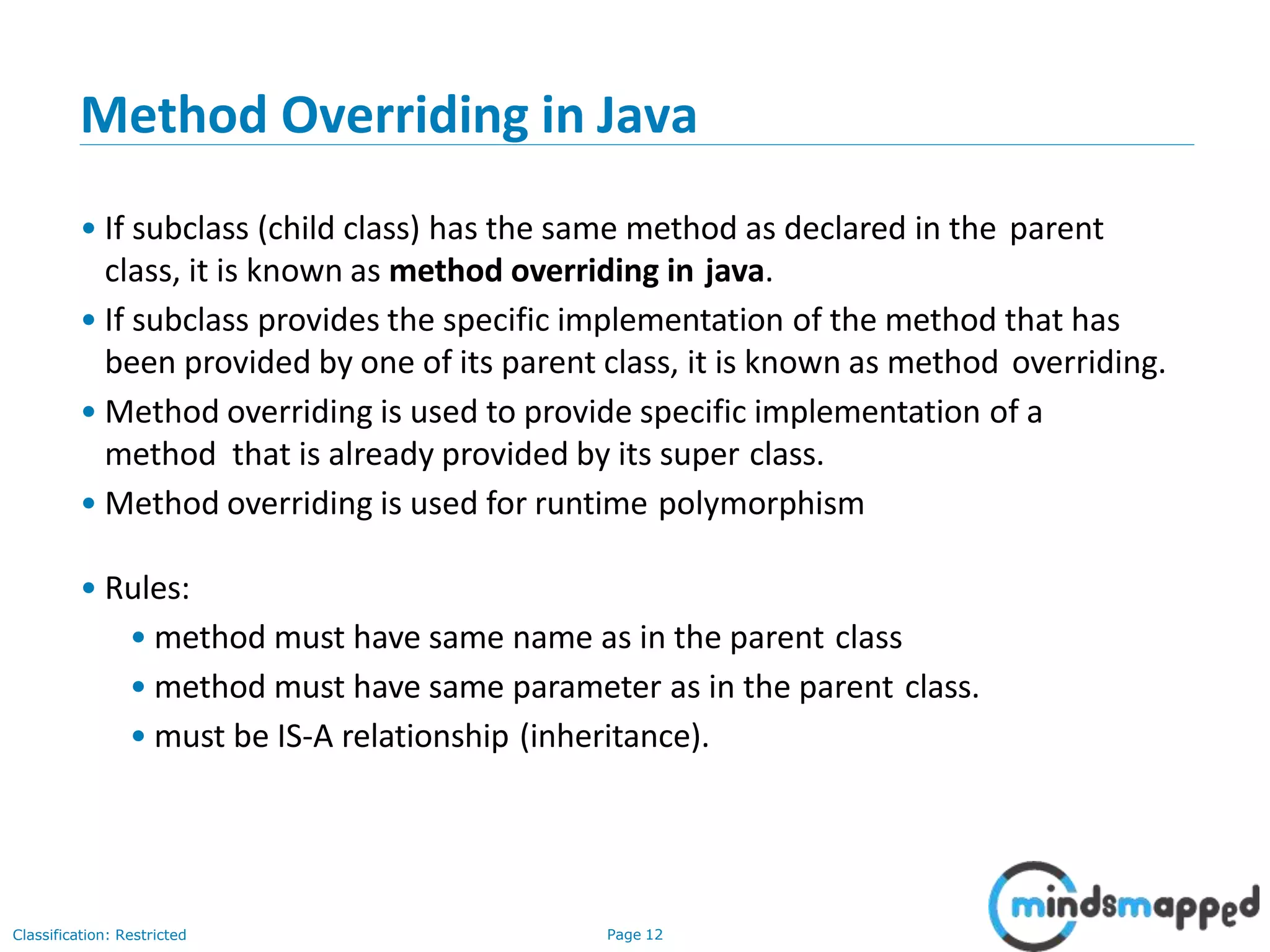
![Example of Method Overriding Classification: Restricted Page 13 class Vehicle{ void run(){System.out.println("Vehicle is running");} } class Bike2 extends Vehicle{ void run(){System.out.println("Bike is running safely");} public static void main(String args[]){ Bike2 obj = new Bike2(); obj.run(); }](https://image.slidesharecdn.com/day9-oopwithjava-part3-180731213533/75/OOP-with-Java-Part-3-12-2048.jpg)
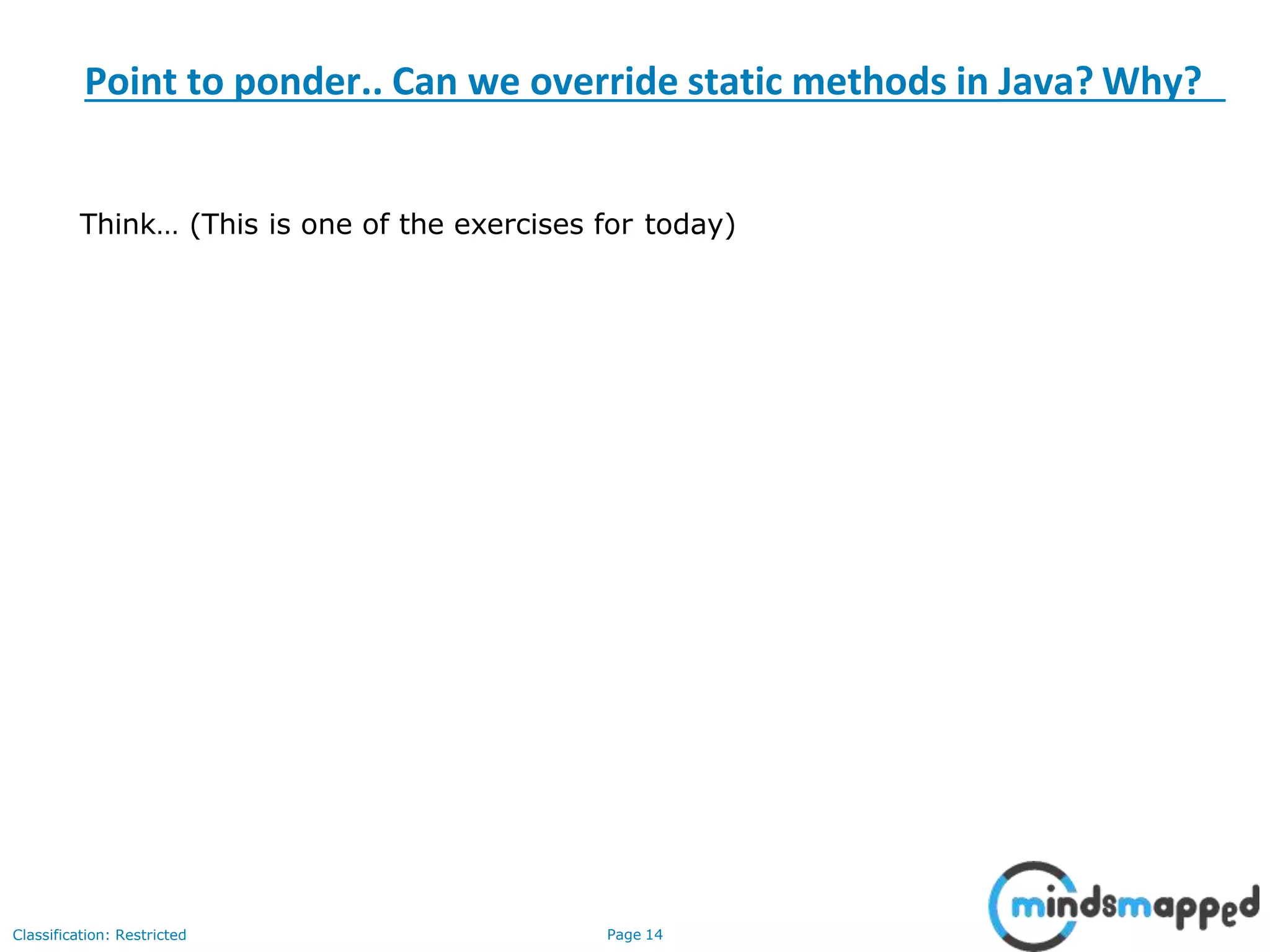
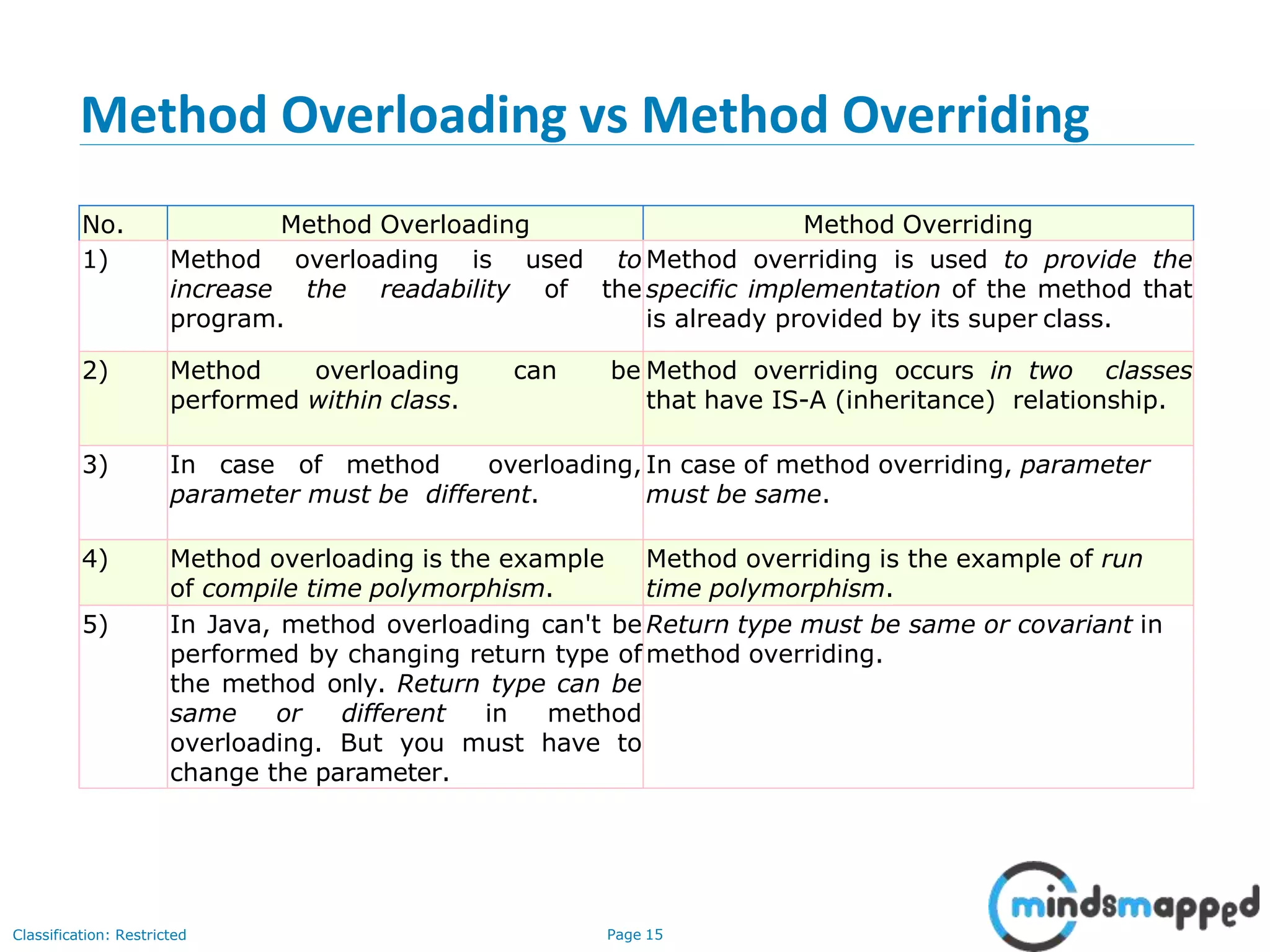
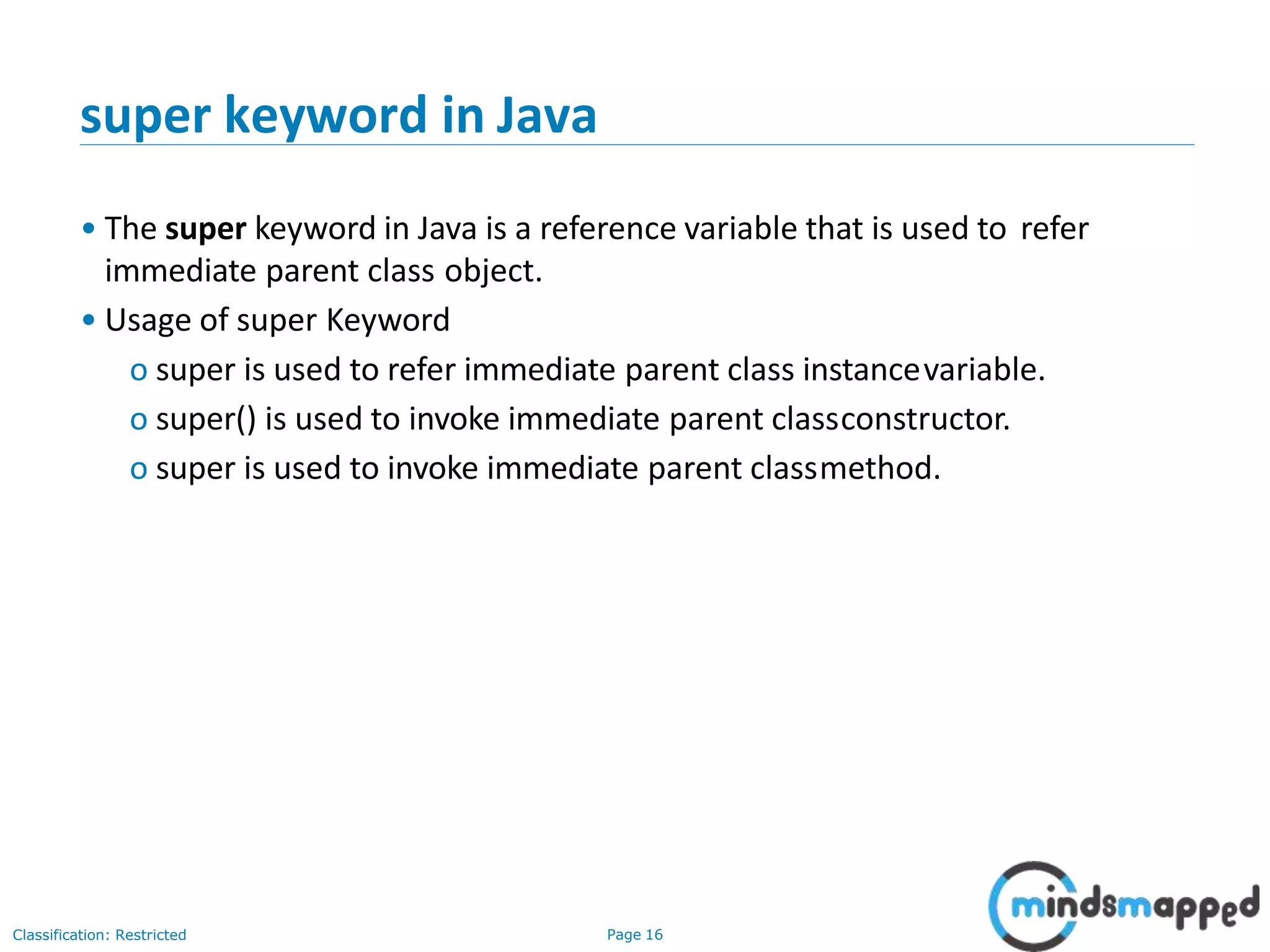
![super used to refer immediate parent class instance variable class Vehicle{ int speed=50; } class Bike3 extends Vehicle{ int speed=100; void display(){ System.out.println(speed);//will print speed of Bike System.out.println(super.speed);//will print speed of Vehicle } public static void main(String args[]){ Bike3 b=new Bike3(); b.display(); } } Classification: Restricted Page 17](https://image.slidesharecdn.com/day9-oopwithjava-part3-180731213533/75/OOP-with-Java-Part-3-16-2048.jpg)
![super is used to invoke parent class constructor Classification: Restricted Page 18 class Vehicle{ Vehicle(){System.out.println("Vehicle is created");} } class Bike5 extends Vehicle{ Bike5(){ super();//will invoke parent class constructor System.out.println("Bike is created"); } public static void main(String args[]){ Bike5 b=new Bike5(); } }](https://image.slidesharecdn.com/day9-oopwithjava-part3-180731213533/75/OOP-with-Java-Part-3-17-2048.jpg)
![super can be used to invoke parent class method Classification: Restricted Page 19 class Person{ void message(){System.out.println("welcome");} } class Student16 extends Person{ void message(){System.out.println("welcome to java");} void display(){ message();//will invoke current class message() method super.message();//will invoke parent class message() method } public static void main(String args[]){ Student16 s=new Student16(); s.display(); } }](https://image.slidesharecdn.com/day9-oopwithjava-part3-180731213533/75/OOP-with-Java-Part-3-18-2048.jpg)
![super not required here Classification: Restricted Page 20 class Person{ void message(){System.out.println("welcome");} } class Student17 extends Person{ void display(){ message();//will invoke parent class message() method } public static void main(String args[]){ Student17 s=new Student17(); s.display(); } }](https://image.slidesharecdn.com/day9-oopwithjava-part3-180731213533/75/OOP-with-Java-Part-3-19-2048.jpg)
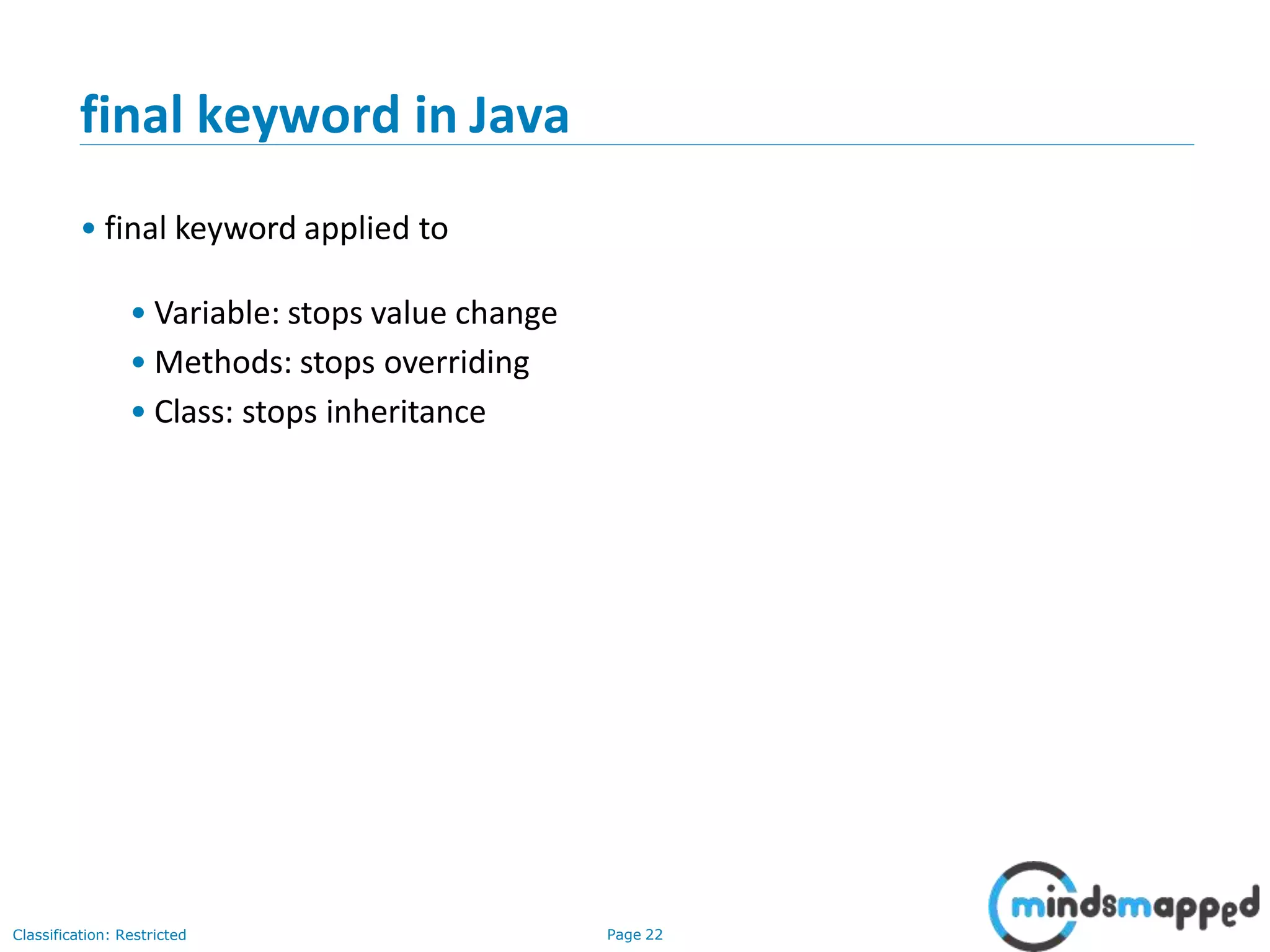
![final variable Classification: Restricted Page 23 final variable once assigned a value can never be changed. class Bike9{ final int speedlimit=90;//final variable void run(){ speedlimit=400; //compile-time error } public static void main(String args[]){ Bike9 obj=new Bike9(); obj.run(); } }//end of class](https://image.slidesharecdn.com/day9-oopwithjava-part3-180731213533/75/OOP-with-Java-Part-3-21-2048.jpg)
![final method – cannot override Classification: Restricted Page 24 class Bike{ final void run(){System.out.println("running");} } class Honda extends Bike{ void run(){System.out.println("running safely with 100kmph");} //compile-time error public static void main(String args[]){ Honda honda = new Honda(); honda.run(); } }](https://image.slidesharecdn.com/day9-oopwithjava-part3-180731213533/75/OOP-with-Java-Part-3-22-2048.jpg)
![final class – cannot extend Classification: Restricted Page 25 final class Bike{} class Honda1 extends Bike{ //compile-time error void run(){System.out.println("running safely with 100kmph");} public static void main(String args[]){ Honda1 honda= new Honda(); honda.run(); } }](https://image.slidesharecdn.com/day9-oopwithjava-part3-180731213533/75/OOP-with-Java-Part-3-23-2048.jpg)
![Blank final variables must be initialized only in constructor Classification: Restricted Page 26 class Bike10{ final int speedlimit; // blank final variable Bike10(){ speedlimit=70; // initialized in constructor System.out.println(speedlimit); } public static void main(String args[]){ new Bike10(); } }](https://image.slidesharecdn.com/day9-oopwithjava-part3-180731213533/75/OOP-with-Java-Part-3-24-2048.jpg)
![final parameter example Classification: Restricted Page 27 class Bike11{ int cube(final int n){ n=n+2; //can't be changed as n is final n*n*n; } public static void main(String args[]){ Bike11 b=new Bike11(); b.cube(5); } }](https://image.slidesharecdn.com/day9-oopwithjava-part3-180731213533/75/OOP-with-Java-Part-3-25-2048.jpg)

![Java Runtime Polymorphism – Example of Upcasting Classification: Restricted Page 29 class Animal{ void eat(){System.out.println("eating");} } class Dog extends Animal{ void eat(){System.out.println("eating fruits");} } class BabyDog extends Dog{ void eat(){System.out.println("drinking milk");} public static void main(String args[]){ Animal a1,a2,a3; a1=new Animal(); a2=new Dog(); a3=new BabyDog(); a1.eat(); a2.eat(); a3.eat(); } }](https://image.slidesharecdn.com/day9-oopwithjava-part3-180731213533/75/OOP-with-Java-Part-3-27-2048.jpg)
![Static and dynamic binding Classification: Restricted Page 30 Static Binding: Type of object determined at Compile time. class Dog{ private void eat(){System.out.println("dog is eating...");} public static void main(String args[]){ Dog d1=new Dog(); d1.eat(); } } Dynamic Binding: Type of object determined at run time class Animal{ void eat(){System.out.println("animal is eating...");} } class Dog extends Animal{ void eat(){System.out.println("dog is eating...");} public static void main(String args[]){ Animal a=new Dog(); a.eat(); } }](https://image.slidesharecdn.com/day9-oopwithjava-part3-180731213533/75/OOP-with-Java-Part-3-28-2048.jpg)
![instanceof operator Classification: Restricted Page 31 • used to test whether the object is an instance of the specified type (class or subclass or interface). class Simple1{ public static void main(String args[]){ Simple1 s=new Simple1(); System.out.println(s instanceof Simple1);//true } } class Animal{} class Dog1 extends Animal{//Dog inherits Animal public static void main(String args[]){ Dog1 d=new Dog1(); System.out.println(d instanceof Animal);//true } }](https://image.slidesharecdn.com/day9-oopwithjava-part3-180731213533/75/OOP-with-Java-Part-3-29-2048.jpg)
![class Dog2{ public static void main(String args[]){ Dog2 d=null; System.out.println(d instanceof Dog2);//false } } Classification: Restricted Page 32 instanceof operator](https://image.slidesharecdn.com/day9-oopwithjava-part3-180731213533/75/OOP-with-Java-Part-3-30-2048.jpg)
